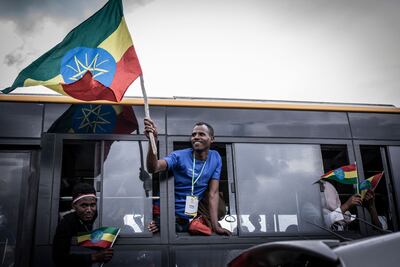The history of engagement between the UAE and the Federal Democratic Republic of Ethiopia extends as far back as the founding of the UAE as a nation, and this year marks 30 years of diplomatic ties, a period of time that has seen significant growth in both countries.
The late Sheikh Zayed bin Sultan Al Nahyan, the UAE Founding Father, held a firm belief that the UAE’s partnerships and people-to-people ties with African nations, including Ethiopia, would assume paramount importance in a dynamic global landscape. Sheikh Zayed was unwavering in his conviction that placing people at the heart of every policy and partnership would lead to tangible benefits across education, health and social development.
This legacy of UAE-Africa co-operation continues to be championed by President Sheikh Mohamed, whose official visit to the Ethiopian capital Addis Ababa on August 18 underscored the UAE’s enduring commitment to bolstering ties with African nations in pursuit of mutual stability, prosperity and peace.

Sheikh Mohamed and Ethiopian Prime Minister Abiy Ahmed addressed issues in the international community, including climate change, economic growth and sustainable development.
The countries co-operate in areas as wide-ranging as agriculture, finance, culture, tourism, government development, food security, renewable energy, trade, investment, industry and advanced technology. In doing so, they nurture shared benefits for their people, with an emphasis on fostering long-term prosperity and development for the region and beyond.
Sheikh Mohamed continues to advocate for bold action and diverse partnerships that are essential to ensuring a sustainable future. This affirms the UAE’s approach to building bridges of co-operation and dialogue with international partners to confront global challenges.
In Addis Ababa, Sheikh Mohamed’s attendance at the inauguration of the Water and Energy Exhibition at the Science Museum and tree planting initiative showcased that the UAE and Ethiopia prioritise sustainability initiatives. Both countries remain committed to advancing renewable energy and stimulating economic growth through climate innovation, especially as the UAE works towards its objective of attaining climate neutrality by 2050.
Building upon an existing bilateral trade volume of $1.4 billion, the UAE and Ethiopia recognise that effective climate action can create jobs, enhance livelihoods and achieve lasting growth.

In 2022 alone, the UAE’s non-oil exports to Ethiopia reached $210.3 million, with notable exchange in the pharmaceutical, chemicals, and food industries. Re-exports reached $553.3 million, and by the end of last year, UAE investments in Ethiopia stood at $2.9 billion, demonstrating the UAE’s keenness to build upon a strong foundation of trade and investment with Ethiopia.
Moreover, the investment opportunities between the two countries present further prospects to collaborate in the field of renewable energy, particularly solar energy. In this regard, the UAE remains invested in developing renewable energy across Africa.
Last year, the Etihad 7 initiative was launched at Abu Dhabi Sustainability Week and reinforced the UAE’s keenness to work alongside its African partners to achieve 20GW capacity and supply 100 million people across the continent with clean electricity by 2035.
The ambitious clean energy objectives of African nations present significant areas for collaboration with the UAE – which was the first country in the region to sign and ratify the Paris Agreement, the first to commit to an economy-wide reduction in emissions, the first in the region to announce a Net Zero by 2050 Strategic Initiative, and is home to the International Renewable Energy Agency.

Earlier this year, the UAE’s Masdar signed an agreement with Ethiopia to jointly develop a solar project with a capacity of 500 megawatts. This will diversify Ethiopia’s energy mix and widen access to clean, affordable energy. The positive results are expected to further boost technical and economic co-operation between the two countries.
On the sidelines of this visit, 11 memorandums of understanding were signed between the two governments to further reinforce the bilateral commitment to joint action in various areas, including sustainability and food, water and energy security.
A memorandum of understanding between the UAE's Talc Investment and the Ethiopian Ministry of Agriculture pledges to increase wheat production near the Omo river basin to build domestic capacity and enhance food security in Ethiopia.

Moreover, a memorandum of understanding between DP World and the Ethiopian Ministry of Transport will advance Ethiopia’s logistics infrastructure, thereby enabling the government to hold strategic reserves of key commodities and future-proof the country from supply chain disruptions.
Another agreement will see Abu Dhabi Ports work with its Ethiopian partners to develop fuel storage and distribution depots in different locations in Ethiopia, ensuring that critical facilities, businesses and communities have access to fuel that powers livelihoods.
Investing in resilience and collective progress is a priority for the UAE as it strengthens its international partnerships for the benefit of future generations. As part of the Year of Sustainability, and prior to the UAE hosting the climate summit Cop28 in November, more attention has been given to initiatives in sustainability and climate action.
The UAE's Zayed Sustainability Prize, launched by Sheikh Mohamed, created the Beyond2020 initiative to foster inclusive development and uplift communities. In August, the Beyond2020 deployment in Ethiopia – a humanitarian drive supported by local and international organisations – resulted in thousands of people gaining access to clean drinking water facilitated by solar energy. Through their ongoing partnership, both governments demonstrate the power of combining resources and expertise to transform lives.
The UAE looks forward to Ethiopia’s contributions at Cop28, where the country can share its vast experience in resource management and sustainability innovation with partners around the world.
The UAE and Ethiopia will continue working together to ensure Sheikh Mohamed’s visit to Addis Ababa yields great achievements. For the UAE and Ethiopia, such partnerships represent a bridge to prosperity and the opportunity to create a better world for all.


